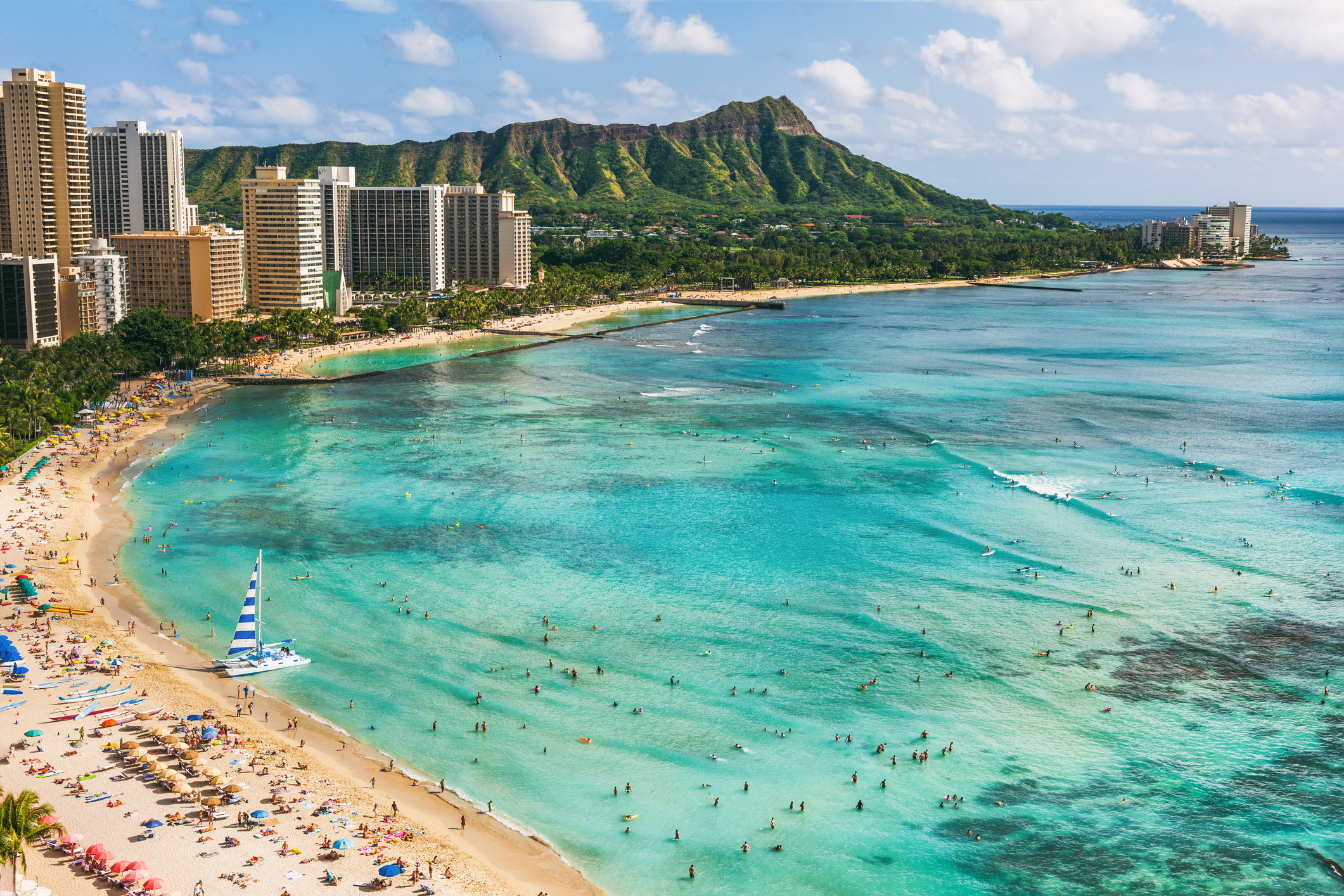Hawaii Approves First-of-its-Kind 'Green Fee' for Tourists: What to Know
Your trip to the Aloha State could be a bit more expensive next year. Here's why


Profit and prosper with the best of Kiplinger's advice on investing, taxes, retirement, personal finance and much more. Delivered daily. Enter your email in the box and click Sign Me Up.
You are now subscribed
Your newsletter sign-up was successful
Want to add more newsletters?

Delivered daily
Kiplinger Today
Profit and prosper with the best of Kiplinger's advice on investing, taxes, retirement, personal finance and much more delivered daily. Smart money moves start here.

Sent five days a week
Kiplinger A Step Ahead
Get practical help to make better financial decisions in your everyday life, from spending to savings on top deals.

Delivered daily
Kiplinger Closing Bell
Get today's biggest financial and investing headlines delivered to your inbox every day the U.S. stock market is open.

Sent twice a week
Kiplinger Adviser Intel
Financial pros across the country share best practices and fresh tactics to preserve and grow your wealth.

Delivered weekly
Kiplinger Tax Tips
Trim your federal and state tax bills with practical tax-planning and tax-cutting strategies.

Sent twice a week
Kiplinger Retirement Tips
Your twice-a-week guide to planning and enjoying a financially secure and richly rewarding retirement

Sent bimonthly.
Kiplinger Adviser Angle
Insights for advisers, wealth managers and other financial professionals.

Sent twice a week
Kiplinger Investing Weekly
Your twice-a-week roundup of promising stocks, funds, companies and industries you should consider, ones you should avoid, and why.

Sent weekly for six weeks
Kiplinger Invest for Retirement
Your step-by-step six-part series on how to invest for retirement, from devising a successful strategy to exactly which investments to choose.
If you’re planning a Hawaii vacation soon, expect a new tax coming your way.
That's because Hawaii just became the first state to impose a so-called "Green Fee" or "green tax" for tourists.
The fee, designed to help protect Hawai'i's natural ecosystem from the impacts of climate change, will raise the state’s transient accommodations tax (TAT) for nightly lodging. It will apply to hotel stays, cruise ship cabins, and short-term rentals.
From just $107.88 $24.99 for Kiplinger Personal Finance
Become a smarter, better informed investor. Subscribe from just $107.88 $24.99, plus get up to 4 Special Issues

Sign up for Kiplinger’s Free Newsletters
Profit and prosper with the best of expert advice on investing, taxes, retirement, personal finance and more - straight to your e-mail.
Profit and prosper with the best of expert advice - straight to your e-mail.
Since the Aloha State welcomes roughly 10 million visitors yearly, state officials say the fee could raise around $100 million annually.
A portion of the revenue from the climate impact fee will be directed toward Hawaii’s response to future disasters, like the Maui wildfire of 2023.
“Hawaii is at the forefront of protecting our natural resources, recognizing their fundamental role in sustaining the ecological, cultural, and economic health of Hawaiʻi,” said Gov. Josh Green in a press statement.
So, how much will the so-called "Green Fee" add to your stay in Hawaii?
Here's what you need to know, along with some other taxes you can expect when booking a trip.
Hawaii approves 'green tax' for tourists
Hawaii’s new climate impact fee will go into effect next year, in 2026. As mentioned, the fee is designed to mitigate climate change impacts by addressing wildfire risks and protecting vulnerable environments.
Gov. Green, who signed Act 96 into law, says the fee will translate to visitors paying an additional $3 per night on a $400 room stay.
“The fee will restore and remediate our beaches and shorelines and harden infrastructure critical to the health and safety of all who call Hawaii home, whether for a few days or a lifetime,” Green said in a statement.
If you’re planning to travel to Hawaii, here are some added fees you can expect for your nightly stay at a hotel and short-term rentals.
Note: Cruise ships that port in the state will also face TAT taxes for the first time.
- The tax that travelers pay for their hotel or vacation rental rooms — called the Transient Accommodation Tax (TAT) — is set to go up in Hawaii. Right now, it’s 10.25%, but next year it will be 11%. In 2027, it’s expected to rise again to 12%.
- Hawaii’s four counties can add an extra tax on top of the state TAT. All of them have decided to add the maximum possible, which is another 3%. When you add that to the new state TAT, you could end up paying a total tax of 14% for your accommodations.
- The General Excise Tax (GET) is also part of the bill, added to your room rate. That changes depending on which island you’re on, ranging from 4% to 4.5%.
Hawaii ‘green fee’ to raise $100 million a year

Hawaii's new "green tax" will apply to cruise ships that visit the island in 2026. Currently, cruises are exempt from the state’s transient accommodation tax, which is 10.25%.
The climate impact fee is expected to usher in $100 million annually. Gov. Green's administration will work with the state legislature to select projects and determine which local groups will benefit.
According to the governor's office, some key projects will likely include environmental stewardship, climate and hazard resiliency, and sustainable tourism.
Meanwhile, some groups and local reporters are concerned that part of the ‘green fee’ revenue could go to the state’s general fund.
- Originally, the governor’s proposal directed climate fee revenue to two new special funds: the Climate Mitigation and Resiliency Special Fund and the Economic Development and Revitalization Special Fund.
- However, after negotiations with the state Senate Ways and Means Committee, the final bill removed those special funds and put the revenue into the general fund instead.
- The bill requires the governor to request an amount close to the extra TAT revenues in the executive or supplemental budget to use the funds for projects addressing climate change, environmental protection, or tourism impact mitigation.
Why does this matter? Sometimes, when new taxes or fees are placed into the general fund, there is a risk that the money may be allocated to other shifting state priorities or unrelated projects, rather than the intended goals.
That uncertainty has led to questions about whether the climate fee will truly support the environmental and climate-related objectives it is designed to address.
Why Hawaii’s climate fee is a historic win
Though general tourist taxes aren't new, Hawaii is the first U.S. state to create a tax to address the rapid impact of climate change and mitigate the impact tourism can have on the environment.
The legislature found that the Aloha State is experiencing a climate emergency, with effects of climate change already impacting its residents and natural ecosystems. Some events have included rising temperatures, prolonged droughts, and destructive weather events that have impacted the islands.
Lawmakers also found that economic development couldn't be separated from environmental stewardship, as most of Hawaii’s economy is dependent on its natural resources.
The measure comes two years after a deadly wildfire engulfed some areas of the island of Maui and destroyed more than 2,200 structures in its wake. The U.S. Fire Administration reported that the natural disaster resulted in about $5.5 billion in damages. In Lahaina, more than 100 lives were lost.
Taking action now, through enacting a ‘green fee,’ could be a proactive step to safeguard the environment, residents, and businesses of the islands. Though Hawaii is the first state to usher in a tax of this kind, and the benefits remain to be seen, perhaps more states will follow.
Related Content
Profit and prosper with the best of Kiplinger's advice on investing, taxes, retirement, personal finance and much more. Delivered daily. Enter your email in the box and click Sign Me Up.

Gabriella Cruz-Martínez is a finance journalist with 8 years of experience covering consumer debt, economic policy, and tax.
Gabriella’s work has also appeared in Yahoo Finance, Money Magazine, The Hyde Park Herald, and the Journal Gazette & Times-Courier.
As a reporter and journalist, she enjoys writing stories that empower people from diverse backgrounds about their finances, no matter their stage in life.
-
 Quiz: Do You Know How to Avoid the "Medigap Trap?"
Quiz: Do You Know How to Avoid the "Medigap Trap?"Quiz Test your basic knowledge of the "Medigap Trap" in our quick quiz.
-
 5 Top Tax-Efficient Mutual Funds for Smarter Investing
5 Top Tax-Efficient Mutual Funds for Smarter InvestingMutual funds are many things, but "tax-friendly" usually isn't one of them. These are the exceptions.
-
 AI Sparks Existential Crisis for Software Stocks
AI Sparks Existential Crisis for Software StocksThe Kiplinger Letter Fears that SaaS subscription software could be rendered obsolete by artificial intelligence make investors jittery.
-
 How to Open Your Kid's $1,000 Trump Account
How to Open Your Kid's $1,000 Trump AccountTax Breaks Filing income taxes in 2026? You won't want to miss Form 4547 to claim a $1,000 Trump Account for your child.
-
 In Arkansas and Illinois, Groceries Just Got Cheaper, But Not By Much
In Arkansas and Illinois, Groceries Just Got Cheaper, But Not By MuchFood Prices Arkansas and Illinois are the most recent states to repeal sales tax on groceries. Will it really help shoppers with their food bills?
-
 New Plan Could End Surprise Taxes on Social Security 'Back Pay'
New Plan Could End Surprise Taxes on Social Security 'Back Pay'Social Security Taxes on Social Security benefits are stirring debate again, as recent changes could affect how some retirees file their returns this tax season.
-
 New Gambling Tax Rule Impacts Super Bowl 2026 Bets
New Gambling Tax Rule Impacts Super Bowl 2026 BetsTaxable Income When Super Bowl LX hype fades, some fans may be surprised to learn that sports betting tax rules have shifted.
-
 Should You Do Your Own Taxes This Year or Hire a Pro?
Should You Do Your Own Taxes This Year or Hire a Pro?Taxes Doing your own taxes isn’t easy, and hiring a tax pro isn’t cheap. Here’s a guide to help you figure out whether to tackle the job on your own or hire a professional.
-
 Trump $10B IRS Lawsuit Hits an Already Chaotic 2026 Tax Season
Trump $10B IRS Lawsuit Hits an Already Chaotic 2026 Tax SeasonTax Law A new Trump lawsuit and warnings from a tax-industry watchdog point to an IRS under strain, just as millions of taxpayers begin filing their 2025 returns.
-
 Can I Deduct My Pet On My Taxes?
Can I Deduct My Pet On My Taxes?Tax Deductions Your cat isn't a dependent, but your guard dog might be a business expense. Here are the IRS rules for pet-related tax deductions in 2026.
-
 Don't Overpay the IRS: 6 Tax Mistakes That Could Be Raising Your Bill
Don't Overpay the IRS: 6 Tax Mistakes That Could Be Raising Your BillTax Tips Is your income tax bill bigger than expected? Here's how you should prepare for next year.